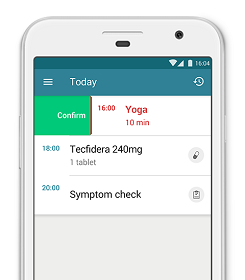Multiple Sclerosis: Control Your Therapy and Prevent Relapses with an App
Life with MS Can Be Challenging, but Taking Medication for It Shouldn’t Be. Find out How MyTherapy Can Help You with Medication Management and Avoiding Relapses.

Multiple sclerosis (MS) is a chronic condition of the brain and spinal cord (the central nervous system). It is an autoimmune disease where the immune system attacks the protective sheath (called myelin) that covers nerve fibers. This causes communication problems between your brain and the rest of the body and in the later stages of the condition, it can cause permanent nerve damage. Because MS can be a potentially disabling condition, the thought of how to limit the effects and symptoms of MS is often prominent in a patient’s mind. While MS is not yet curable, modern drugs and treatment options are able to reduce the frequency and duration of relapses. While choosing the correct medication with a medical professional is crucial, it is also imperative that it is taken as intended. Setting a schedule, using medication reminders, and keeping an MS diary or health journal can greatly help when it comes to managing MS as effectively as possible.
MyTherapy is one of Europe’s leading medication reminder and health tracker apps and is used by many people living with MS. The app’s built-in medication database contains the medications used to help treat MS, as well as associated conditions like depression. The database includes injected interferons (e.g. Refib, Copaxone, Avonex, and Betaferon) and tablets such as Tecfidera, Aubagio, and Gilenya. Newly-announced drugs such as Ocrevus and Cladribine can also be found in MyTherapy. You can also upload your medication by scanning the barcode of your medication packaging by using the app’s built-in barcode scanner. The app reminds you when medication is due and tracks the intake in a diary. The alarms can be set to silent or vibrate and you will also be reminded of medication intake via a pop- notification. You can also use the alarm-reminder function for doctors’ appointments.
MyTherapy also allows you to track your symptoms, medication side-effects, and general well-being. All of this information is collected and the app then generates a monthly a health report, which can be printed or shared digitally with your doctor. Your doctor can then use the information to help assess the effectiveness of your therapy. You can also invite family and friends on the app for additional support when it comes to medication adherence. The team at MyTherapy also takes user feedback seriously, ensuring that the app is constantly updated and tailored to your needs as best as possible. These features make MyTherapy an effective analysis tool for monitoring the episodes between disease and remission.
About MS: Autoimmune Disease of the Nervous System
MS is a chronic disease that attacks the brain and spinal cord, causing a variety of symptoms. The intensity of the disease varies, ranging from mild symptoms to severe disabilities. It is an autoimmune disease, which causes the immune system to attack the healthy cells in your body. In the case of MS, the immune system attacks the myelin sheaths of the nerve cells. The myelin sheath is a white, fatty substance that surrounds the nerve cells and isolates them so that stimuli can be passed on correctly. In MS, the myelin sheath and the underlying nerve are damaged and scarred, causing the slowing or interruption of the signal in the nerve. This means that your nerves don’t work properly to help you move and feel.
MS is usually diagnosed in people between the ages of 20 and 40. 400,000 people are estimated to have MS in the USA, over 100,000 people in the UK, and 2,5 million worldwide.
MS Triggers: Genetic and Environmental Factors Play a Role
The exact triggers for MS are unknown. Nevertheless, a combination of genetic and environmental factors seems to play a role in the condition. Although MS is not directly hereditary, there are certain genes that increase the risk of developing it. Regular smoking is also considered a considerable risk factor. Certain viral infections, such as the Epstein-Barr virus or human herpes virus 6, can also affect the functioning of the immune system and trigger the disease. Vitamin D, which the body forms with the help of solar radiation, seems to be a protective factor against the disease, meaning that MS is more widespread in countries with fewer hours of sunshine.
The symptoms of MS can affect any part of the body and vary from person to person. Some of the most common are:
- Coordination disorders (trembling, gait problems)
- Fatigue (CFS)
- Muscle weakness or spasms
- Blurred vision or other visual disturbances
- Incontinence
- Impaired thinking and memory
- Sensory disturbances
- Numbness and tingling
- Poor bladder or bowel control
- Pain
There are four forms of MS, the distinction depending upon whether the symptoms occur in a phased manner or whether they progressively worsen over time.
Relapsing-Remitting MS (RRMS) is the most common variant and affects more than 80% of patients. In the early stages of the condition, symptoms can be completely absent - sometimes even for years. Unfortunately, relapses are unpredictable and symptoms can occur at any time. Both new and existing effects may appear suddenly, lasting a few days or weeks before disappearing. Regardless of the length of time between relapses, the disease usually remains fundamentally active.
Secondary-Progressive MS (SPMS) is usually considered the second stage of the disease. After 10 years, approximately 40% of patients progress from RRMS to SPMS and it is possible for this transition to occur earlier. Single relapses occur as in RRMS, but the regression is incomplete and symptoms continue to worsen in between relapses.
Primary-Progressive MS (PPMS) is rare and affects approximately 10% of all MS patients. Symptoms gradually worsen from the outset and relapses and remissions are absent (although there are occasional temporary improvements).
The least common form is Progressive-Relapsing MS (PRMS), which affects around 5% of patients. This is also characterized by a steady worsening of the condition with acute relapses but no remissions.
There are two extremes in MS, namely “benign” syndrome and the Marburg variant. In “benign” syndrome, patients have few symptoms, even decades after diagnosis. With the Marburg variant, the patient experiences rapidly progressive symptoms and death may occur after a very short time.
The Right Medication Is Crucial
MS is currently not curable. For RRMS, several treatments exist to counteract the effects and consequences effectively. Different drugs can slow down the progression of the disease, prevent or treat recurrences, and ease the stress or symptoms. These drugs include beta interferons, copolymer-1, dimethylfumarate, teriflunomide, mitoxantrone, and natalizumab. For the progressive form (SPMS), some therapies that can slow down the disease have been explored, but no general treatment has been found.
In addition to drug interventions, weakness and gait problems caused by MS can be alleviated with the aid of physiotherapy and work therapy. Medicines can also be used to relieve fatigue, depression, pain, or bladder weakness. The latest treatment methods developed during the last 20 years have significantly improved the quality of life for people with MS. Most people with MS have a normal life expectancy. If patients don’t receive treatment, over 30% may develop severe problems with mobility.
Make Everyday Life with MS Easier with MyTherapy
To keep the symptoms of MS in check, the appropriate therapy must be decided upon with your treating physician. In order to help you stay on top of your chosen therapy, smartpatient has developed the MyTherapy app. The app’s reliable reminder function makes taking medication punctually a simple-to-do task and the ability to track your symptoms and general well-being can provide doctors with important information about how your condition is progressing and the effectiveness of your therapy. All-in-all, MyTherapy is essentially your own personal health assistant: it reminds and documents, so you are able to spend more time focused on enjoying life.


